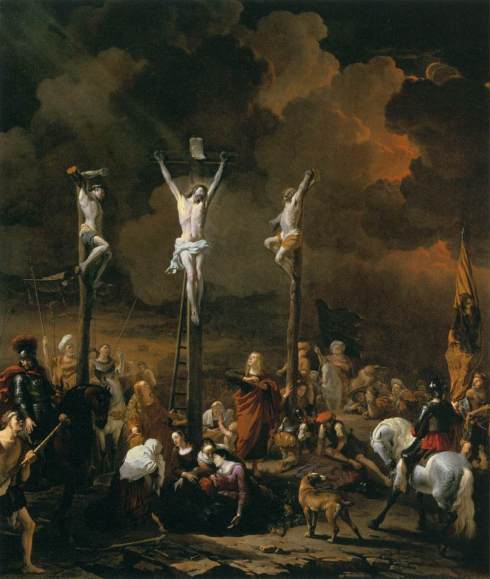 Glenn Pakiam
Glenn Pakiam
Luke 6:20-23. Blessings and Woes.
Blessed Are You Who Weep Now.
Looking at his disciples, He said:
“Blessed are you who are poor,
for yours is the kingdom of God.
21 Blessed are you who hunger now,
for you will be satisfied.
Blessed are you who weep now,
for you will laugh.
22 Blessed are you when people hate you,
when they exclude you and insult you
and reject your name as evil,
because of the Son of Man.
23 “Rejoice in that day and leap for joy, because great is your reward in heaven. For that is how their ancestors treated the prophets.”
“Blessed are you who weep now, for you will laugh.” (vs. 21b.)
When Jesus said blessed, He could have used the spiritual word for blessed which would have meant “God bless(ing).” But, instead, Jesus uses the street slang for blessed. This blessed can mean fortunate, or lucky, not in terms of random chance, but undeserved.
We can also note in the passage that Luke is very sparse in his account. Matthew gives twice as many and is much more spiritual in nature.
“Blessed are the poor in spirit.”
“Blessed are you who hunger and thirst for righteousness.”
But Luke, doesn’t infer anything overtly spiritual.
“Blessed are you who are poor.”
“Blessed are you who hunger now.”
And in the face of Luke’s account what conclusions can we come to? We can either say that Jesus is saying that because they are poor/hungry/weeping/etc. they are lucky. Or, we can say that in spite of the fact that they are poor/hungry/weeping/etc. they are lucky. Why? Because though they are poor/hungry/weeping/etc. the kingdom of God belongs to them.
The tale of the Israelites is one filled with tragedy and sorrow. And the two most numerous scrolls was Deuteronomy, so that they would remember that they are God’s people, and Isaiah, because it was a book of hope. At this point in time, the Israelites are in exile, they are under Roman imperial rule. And so it probably isn’t a coincidence that Jesus reads from Isaiah 61 in Luke 4.
“The Spirit of the Lord is on me,
because he has anointed me
to proclaim good news to the poor.
He has sent me to proclaim freedom for the prisoners
and recovery of sight for the blind,
to set the oppressed free,
to proclaim the year of the Lord’s favor.”
And what does he say?
“Today this scripture is fulfilled in your hearing.”
Jesus came to preach the good news.
But returning to the verse in Luke 6.
We must ask what does it mean to weep? To mourn?
To mourn is to protest. To mourn is to protest – but to protest is to give witness to a greater reality. We are saying this isn’t right; this isn’t fair; this isn’t how things are supposed to be; all is not well.
What is more amazing is that Jesus joins us in our mourning.
Though in lent, we fast to remember Christ’s suffering, all of His suffering was to enter our suffering. And it doesn’t end there. He took the weight of evil on Himself at the cross, rising in victory over it.
Now, there is a very important difference between the resurrection of Christ and all the others in history who were brought back from the dead. They can be more accurately described as a resuscitation. Why? Because they all died again. From Lazarus to the widow’s child Elijah brought back, they all eventually died again. But Christ died, rose again, and has triumphed over death.
The focus of the blessings and woes written by Luke wasn’t in their circumstance or condition, but in the promise they were given.
“Blessed are you who weep now, for you will laugh.” (vs. 21b.)
Our sorrow is temporary, but our comfort is eternal and irreversible. The resurrection was not and is not a compensation for death. It is the reversal of it – the complete and final defeat of it.
But, we can note that though the first and last are present realities, the middle two are future promises.
“For yours is the kingdom of heaven”
“For you will laugh.”
So we are given this contradiction – a present and future reality.
If Paul wrote in 1 Corinthians 15
“Where, O death, is your victory?
Where, O death, is your sting?”
Does this mean that death has been defeated already? Yes and no. It is a present and future reality. A lot of people see the passage above and think that death was soundly defeated in the past. And now it is no longer our enemy, but our friend, or at the least a negligible aspect of this world. They have the audacity to come in the presence of mourners and tell them they shouldn’t be weeping.
There are only two places in the Bible where Jesus says that “it is finished” and both are recorded by John. The first time is in the gospel of John as Jesus is dying on the cross.
Jesus says, “It is finished” and gives up His Spirit.
The second time Jesus says it is in book of Revelations John received and wrote down.
Jesus has returned and after Satan has been vanquished forever, and a new heaven and earth has come, Jesus turns to John and says,
““It is done. I am the Alpha and the Omega, the Beginning and the End. To the thirsty I will give water without cost from the spring of the water of life. 7Those who are victorious will inherit all this, and I will be their God and they will be my children. 8 But the cowardly, the unbelieving, the vile, the murderers, the sexually immoral, those who practice magic arts, the idolaters and all liars—they will be consigned to the fiery lake of burning sulfur. This is the second death.””
When Jesus returns the last enemy (death) will be defeated, so it is ok to mourn a death. To mourn over sin. To give witness to the reality of greater things – because no one was meant to die.
Heaven is not the defeat of death. The kingdom of God is not the defeat of death. The return of Christ is the time of death’s defeat. And we are living in the time of the in-between. The dead awaiting, and we in exile.
Lucky are those whose best life isn’t now, because what’s coming is incomparably better than what is.



